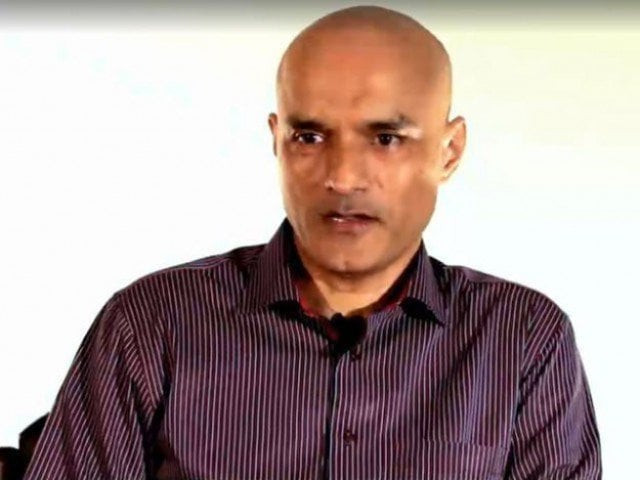Kulbushan verdict: ICJ likely to reject India plea to release convicted spy
Judgment of ICJ in Jadhav's case will be read in open court today at 6pm PST

Self-confessed Indian spy Kulbushan Jadhav. PHOTO: FILE
The judgment of the ICJ in Jadhav's case will be read in open court today at 6pm PST at the Peace Place in The Hague.
Pakistan’s legal team, headed by Attorney General for Pakistan Anwar Mansoor Khan reached Netherlands yesterday.
According to Barrister Taimur Malik, an international law expert, the ICJ is extremely unlikely to award the relief of “acquittal, release and return” of Jadhav as requested by India and relief, if any, is likely to be limited to grant of consular access.
Such an outcome will be considered a victory by Pakistan and it could also be seen as a sign of confidence in Pakistan’s judicial system as Jadhav’s fate would then be decided by courts here.
Pakistan awaits major verdicts with bated breath
In the unlikely event that ICJ decides differently and orders measures in excess of consular access, this would not only be unprecedented but could also face criticism by large parts of the international legal community as unwarranted judicial activism by the international court.
“The Indian media has raised expectations at their end to the extent that their public is expecting an acquittal, which is quite unlikely if not impossible,” said Malik.
Jadhav, a serving commander in the Indian Navy working for India’s Research and Analysis Wing (RAW), was arrested on March 3, 2016, from Balochistan.
Chief of the Army Staff (COAS) General Qamar Javed Bajwa on April 10, 2017, endorsed his death penalty. In June 2017, the Indian spy filed a mercy petition against his death penalty while India approached the ICJ against the conviction. The ICJ stayed his execution.
A 16-judge ICJ bench, led by a Judge Abdulqawi Ahmed Yusuf, for the first time, would decide whether consular access should be given to a spy or not.
Pakistan's former chief justice Tassaduq Hussain Jilani is an ad hoc judge in this case while India’s Dalveer Bhandari, who is a permanent judge at the ICJ, is also a member of the bench.
It is expected that both India and Pakistan judges will write their own note in the verdict.
In five cases, the ICJ has given consular access to the applicant state but it is the first case, in which the ICJ will determine whether or not a spy should be given consular access.
Queens Counsel Khawar Qureshi argued on behalf of Pakistan while Harish Salve gave oral submission on behalf of India. During the hearing, India could not explain why Jadhav possessed two passports.
India argued that Commander Jadhav is an innocent businessman who was kidnapped from Iran, brought to Pakistan and tortured to confess that he was a commander in the Indian Navy and working for RAW, India’s primary intelligence agency.
India also argued that it was entitled to obtain consular access to Jadhav as soon as his detention was made public by Pakistan on March 25, 2016. India further said that the trial and conviction of Jadhav for espionage and terrorism offences by a military court was ‘a farce’.
It contended that the denial of consular access to Jadhav requires the ICJ to ‘at least’ order his acquittal, release and return to India.
In its written pleadings, India had accused Pakistan of violating the Vienna Convention by not giving consular access to Jadhav, arguing that the convention did not say that such access would not be available to an individual arrested on espionage charges.
Pakistan’s response
Pakistan rejected all Indian allegations. It said the evidence obtained from Jadhav after his arrest and during the criminal process leading to his conviction was amply demonstrating his activities in fomenting terrorism and engaging in espionage within Pakistan.
Islamabad maintained that it would be incompatible with international law for someone sent as a spy/terrorist by a state to be afforded access to officials of that state as New Delhi asserts.
Pakistan also pointed to an express Agreement on Consular Access dated May 21, 2008, between India and Pakistan, which allows each state to consider a request for consular access ‘on its merits’ in a case involving national security.
It said Jadhav was provided with an authentic Indian passport under a Muslim name by the Indian authorities which served as a clear and obvious link between his conduct and the government of India. Such conduct is a blatant violation of international law and should bar any claim for relief from a court.
India refused to reply on this issue and [unconvincingly] describes it as “mischievous propaganda”.
Pakistan noted that in its previous decisions concerning Article 36 of the Vienna Convention on Consular Relations 1963 (which involved death sentences imposed by the US), the court made it clear that it was not a court of criminal appeal and the presence of ‘effective review and reconsideration’ by domestic courts was an appropriate remedy, even if a breach of the right to consular access had been established.
The high court and the Supreme Court provide such review as confirmed by the leading UK-based military law experts.
Indian counsel ducks key questions on Jadhav
In addition, India fails to explain why UK-based military law experts are wrong when they say Pakistan’s high court and Supreme Court provide an effective review and reconsideration of the military court process. Confession of the Indian spy is also present in the form of a video message.
New Delhi has repeatedly sought access to the convict but Islamabad denied the permission on the ground that consular access in cases related to spies was not applicable.
Timeline
March 3, 2016, Jadhav was arrested in Balochistan.
April 10, 2017: Military court sentenced him to death.
May 8, 2017: India approached the ICJ against Pakistan for denying consular access to Jadhav.
July 13, 2018: ICJ stays Kulbhushan Jadhav's execution in Pakistan.
Feb 22, 2019: ICJ reserved its judgment in Jadhav case.
July 17, 2019: ICJ to deliver its verdict.



















COMMENTS
Comments are moderated and generally will be posted if they are on-topic and not abusive.
For more information, please see our Comments FAQ